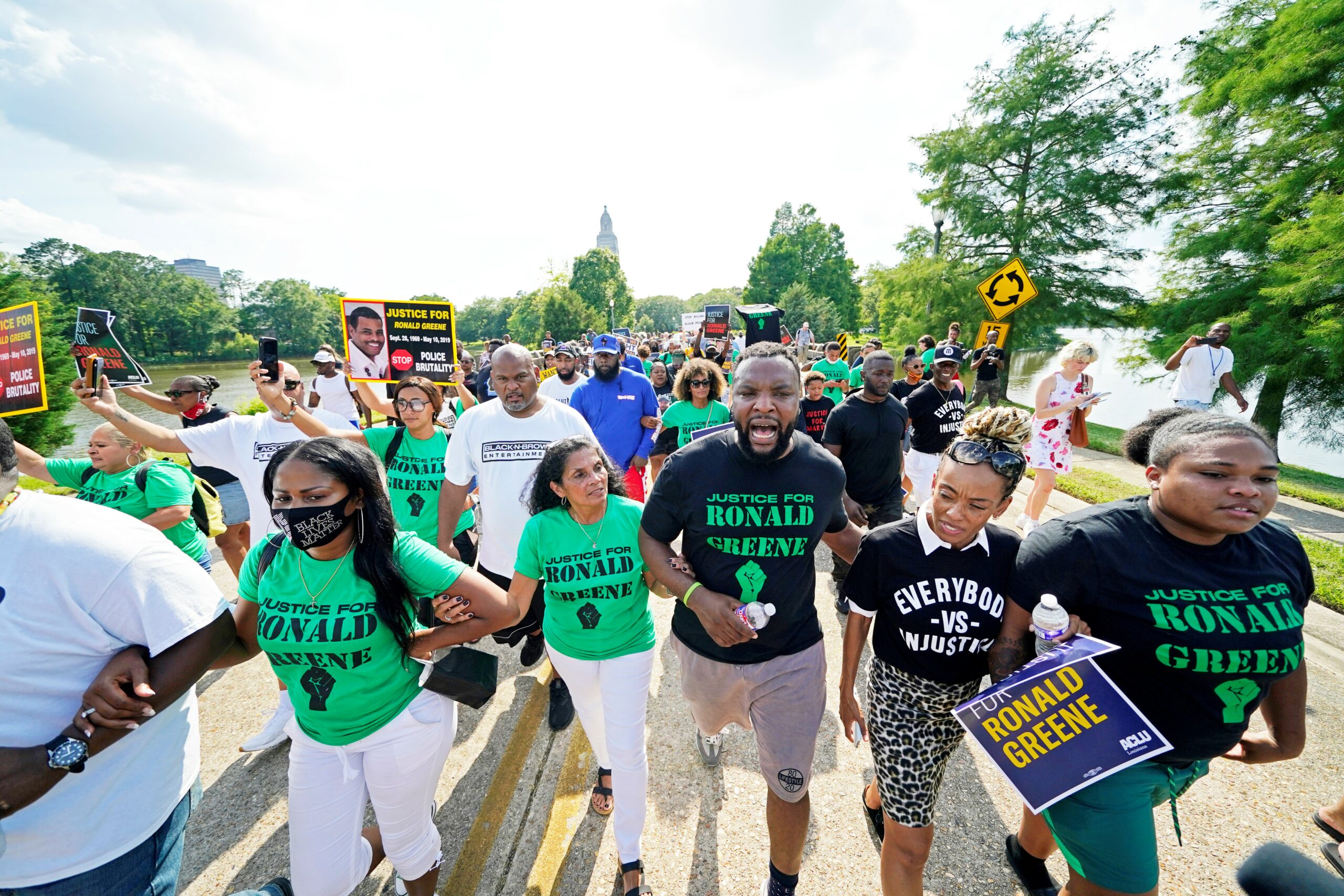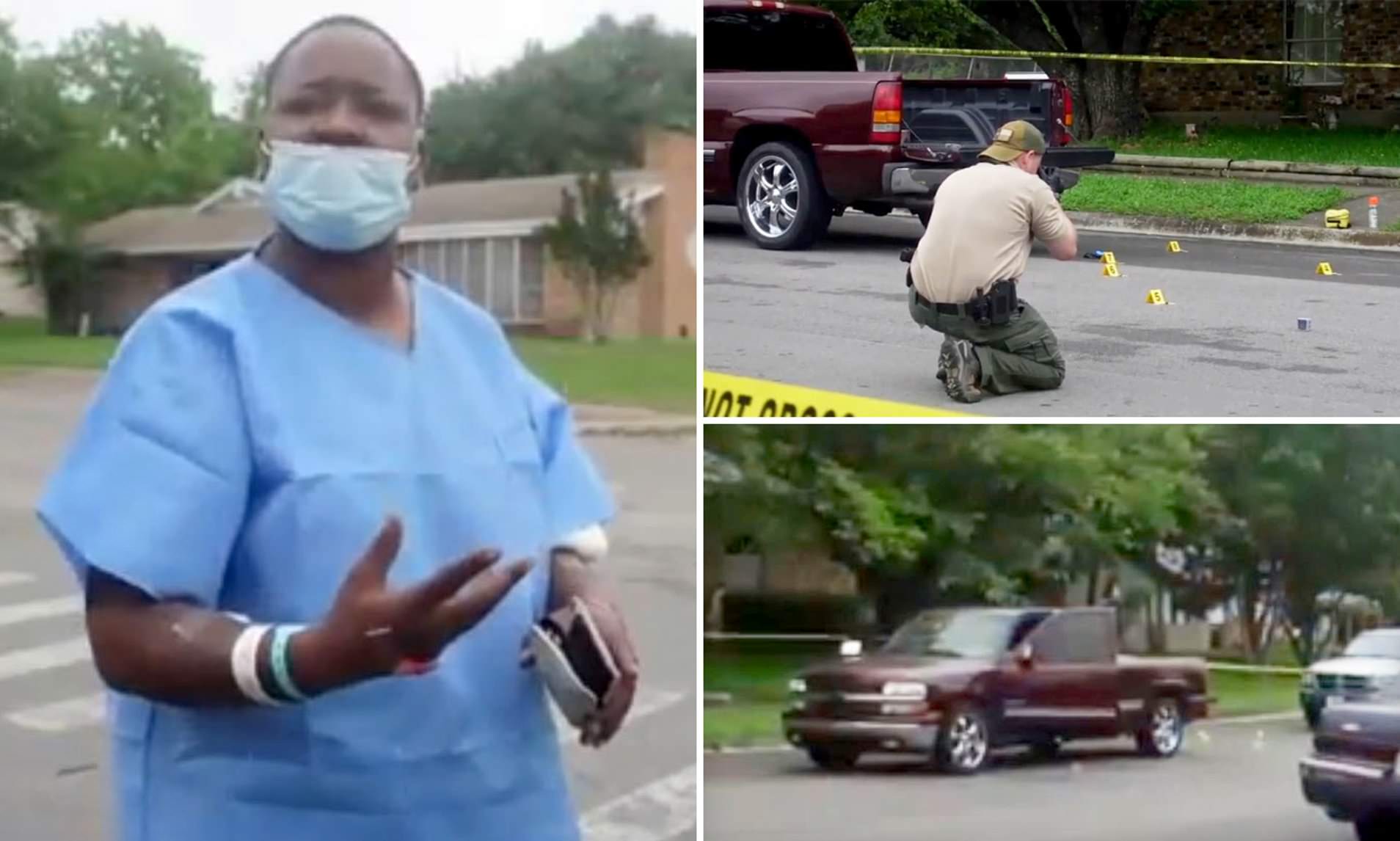by Michael Z. Muhammad and J.S. Adams
Anthony Brown Jr., 42, was in his car sitting outside his home in Elizabeth City, N.C., when the police came. A hail of gunshots followed. Now he is dead. Lymond Moses, 30, was fatally shot by New Castle County Police on Jan. 13, in Wilmington, Del., when they came upon him reportedly resting in his car outside his mother’s home. Again, gunfire followed. Now he is dead.
Adolph Grimes III, 22, was sitting in his car waiting for his cousin to arrive outside the home of relatives in New Orleans while celebrating the New Year with his family when unmarked police cars approached without markings, sirens, or visible police lights. Over 80 shots were fired. Now he is dead.
Police throughout this nation remain out of control as outdated methods of policing and a culture of systemic racism remain intact.
After the verdict in the case of former Minneapolis cop Derek Chauvin, convicted of murdering George Floyd, 46, an unarmed Black man, at least six people were fatally shot by police in the 24 hours that followed. Ahead of his scheduled June 25 sentencing, Mr. Chauvin and his attorney are seeking probation and have also filed paperwork for a new trial.
American law enforcement remains recalcitrant, unrepentant, and unwilling to change. New troubling and disturbing cases and even older cases being brought to light are evidence of this.
“You’re really seeing kind of the long history of police with Black people, unhealthy relationship coming to the surface,” said Dr. Boyce Watkins, entrepreneur, and media analyst.

The police state within the country has authorized officers to act in inappropriate ways, he argued. However, Dr. Watkins also cautioned that making assumptions when a fatal police shooting happens “undermines the credibility of legitimate activism when you sort of jump the gun and don’t look for facts and information.”
But, the case of Lecresha Murray, 36, illustrates the problem is far from over. On May 25 in Copperas Cove, Texas, Ms. Murray states she was shot six times by an off-duty police officer who failed to identify himself following a road rage incident. Ms. Murray reports she got out of her truck to talk to the individual who had been following her closely from behind when he opened fire without warning.
According to the Killeen Daily Herald, Ms. Murry said she did a U-turn to go to a hospital after feeling ill from a chronic condition and as she was maneuvering, the man—identified later as an off-duty Copperas Cove cop—sped around her and began moving slowly. In a rush to get herself to the hospital, Ms. Murry sped up and went around the man. He then began to tailgate her. She sped up again then came to a stop and exited her vehicle to ask him why he was following her so closely.
“I said ‘Man, what is your problem? I’m trying to get to the hospital,’” Ms. Murray said according to the newspaper. “I didn’t walk towards him or none of that. As soon as I said that, he pulled out his gun.” Ms. Murray said the officer yelled to her “What’s in your hands?” After that, Ms. Murray said she ran back to her truck. That’s when she said shots rang out, reported the Killeen Daily Herald. She sustained non-life-threatening injuries. She said he fired 11 shots with six striking her. The name of the officer has not been released.
Daniella Pierre, president of the Miami-Dade NAACP in Florida, says there has to be a paradigm shift in policing. “The way that we policed in the earlier days is not the way that policing needs to happen now,” she said.
She believes public pressure is forcing law enforcement agencies and those in power to take a closer look at the police killings of Black people. However, these incidents also show the country’s so-called “racial reckoning” is as elusive as ever.
Mr. Watkins says the so-called racial reckoning does not exist.
“There are people…that are using the racial tragedy experienced by Black people as an opportunity to pursue what is more of a leftist White liberal agenda,” he said. “I don’t think they care about Black people. I really don’t,” added Dr. Watkins.

“The same individuals who claim that this is a racial reckoning and we’re finally gonna make things right, this is the same people who are in the same breath saying, we’re going to ban somebody like Louis Farrakhan,” said Mr. Watkins, referring to the Honorable Minister Louis Farrakhan of the Nation of Islam. “I don’t think you can trust people who hate the people who love you the most.”
Even with growing calls for police reform, the defunding of police departments and widespread protests, the rate at which police kill civilians has not changed. Politico reports that this year, police killed about three people each day so far this year, which is in alignment with last year’s daily average.
Currently, the National Urban League and other civil rights activists are demanding that authorities fire and prosecute Louisiana State Police troopers involved in the 2019 arrest of Ronald Greene, a Black man who died in police custody. In the initial police narrative, they reported Mr. Greene died of injuries suffered in a car crash.
In the case of Adolph Grimes, he had no criminal record. On January 1, 2009, according to a press release by Glenn C. McGovern, the family attorney, the young Black man was visiting his grandmother and had just dropped off his 17-month-old child. He was sitting in his blue rented Camry with the dome light on combing his hair, waiting for his cousin to arrive.
Mr. Grimes’s car was approached by nine plainclothes officers in two unmarked vehicles who failed to identify themselves, failed to show badges, failed to use flashing lights and the PA/siren was inoperative. According to witnesses, one officer then shouted, “gun, gun, gun!” and 82 shots were fired by the cops without any warning.
The officers involved were subsequently acquitted. Now the family has revived a civil lawsuit against the city for civil rights violations which will proceed to trial on August 2.
For the Black community, problems with police have always been one of police abuse of power characterize by the excessive use of force, including unjustified shootings, severe beatings, fatal choking, and general vulgar treatment, which persists because of the overwhelming barriers to accountability which make it possible for officers to escape reasonable punishment and often to repeat their offenses.

According to Mapping Police Violence, Black people were 28 percent of those killed by police in 2020 despite being only 13 percent of the population. Blacks are three times more likely to be killed by police than Whites. Police killed Black people at higher rates than White people in 47 out of 50 of the largest cities. And 98.3 percent of killings by police from 2013-2020 have not resulted in officers being charged with a crime.
Current calls for reform have come in the form of the national police reform bill called the George Floyd Justice in Policing Act, which would ban chokeholds, include prohibitions on no-knock police raids, and create a national registry for officers who are disciplined for serious misconduct, among other proposals. It has been passed by the House but languishes in the Senate.
Of most import is the call for the passage of police reforms at the state level, including an end to “qualified immunity”— protection from lawsuits for police officers and others for actions they take in the course of their work.
At the heart of police reform is a need to dismantle a system that simple does not work for the Black community.
Another fatal flaw in policing also tied to the command and control model is the appropriation of power on the senior level. This is played out by releasing false narratives and the demonization of the victims prevalent in the George Floyd case and the cases against Anthony Brown Jr., Lymond Moses, Adolph Grimes III and others.
The manipulated narratives to justify police misconduct are deeply integrated with police practice. In addition, there is resistance at all cost to police oversight. With the call to defund the police they are going out kicking and screaming.
Ms. Pierre pointed to the Taskforce on 21st Century Policing created by former President Barack Obama in 2014.
“They have to do not only 21st Century Policing, but they have to do policing for today’s needs. Instead of driving, they got to walk the streets and connect with the people, be more proactive and they have to do those types of things to take a stand against those acts of violence that’s happening in our community,” she said.
The National Organization of Black Law Enforcement Executives (NOBLE), who are primarily African American chief executive officers of law enforcement agencies at federal, state, county, and municipal levels, other law enforcement administrators, and criminal justice practitioners advocated in a press statement for a “duty to intervene policy” that creates an affirmative obligation for police officers to stop other officers from engaging in certain conduct prohibited by law or department policy.
The organization also called for implementing the Blueprint for Modern, Effective 21st Century Policing Practices, which it helped create.
Former Philadelphia Police Commissioner Sylvester Johnson spoke on the BluePrint during a telephone interview with The Final Call. He said, police departments must develop strategies that proactively emphasize the systematic use of community engagement, partnerships, and problem-solving techniques to address conditions that cultivate crime and social disorder.
“Community policing requires cooperation among police, citizens, and local decision-makers to forge effective partnerships that combat criminal activity. The quality of life in the community must be addressed and you must form a relationship with them. You have to go in and sit with community members and ask how we can work together. For me policing is a mindset,” he said.
But what mindset and who’s mindset is being implemented is the question.
Ms. Lauren Smith, with the Law Office of Glenn C. McGovern Corp. representing the family of Adolph Grimes III, told The Final Call that through their lawsuit, they hope to hold the New Orleans Police Department accountable.
“However, our biggest outcome is justice for the family. We see police brutality far too often in Louisiana, and we want that to change. So, we’re hoping legislation will come out of this as well, you know, fair laws on racial profiling, stricter penalties for actually doing it. We also want to see a movement to demilitarize the police. We need more people that are acting like counselors on the police force rather than a military mindset,” she said.
Mr. Watkins says it’s necessary for the Black community to return to grassroots solutions when it comes to policing in America. “It’s going to require a shift in our thinking,” he said.
“The solution we were presented with to solve this policing problem was to go and vote for the guy who was responsible for incarcerating more Black men than any president in American history. [President Joe Biden] is the ultimate police state president and the fact that millions of our people were delusional enough to think that that is an adequate solution, shows how far we have to go in our political maturity,” he told The Final Call.
“So for Black folks, we got to stop aligning ourselves with people who don’t have our best interests at heart,” he added. “We have to align ourselves with leadership … that really care about Black people and really want us to do better.”













